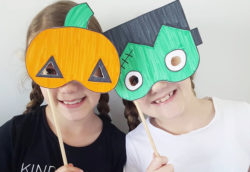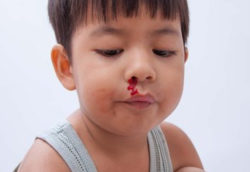Many kids experience nightmares and night terrors, but the majority of the children grow out of them. Nightmare in children is very common. However, mostly it does not cost any psychological long-term harm to your child.
We already had written about “Do babies dream?” and we made a point that it is not very clear at what age the babies begin to dream. But we have noticed toddlers expressing their dreams – pleasant ones or scary ones. Most of the nightmares happen at peak during the preschool years when the kid is afraid of the dark. The occasional frightening or upsetting dream is very common in kids at this age. But usually, the older kids or even the elders have nightmares occasionally. You cannot prevent nightmares, but you can help your little one to have a peaceful night’s rest.
Night Terror vs. Nightmare
Night terrors in children:
There is a major difference between nightmares and night terrors. A kid might have night terrors and end up screaming or thrashing around, and might not realize until you try to comfort them. This is an occurrence of behaviour especially on waking abruptly from a deep sleep or the non-dream state of sleep. Although the child is not fully awake and might as well have no memory of it the next morning. Night terror in kids is also known as “sleep terrors”.
- Night terror occurs mostly earlier in the night when kids spend a longer time in deep sleep.
- Kids might appear distressed and seem to be awake but it is just an illusion, they are never fully awake.
- Children barely remember their sleep terrors or any memory of it.
- Kids can hurt themselves because the night terrors involve movements like sleep walking etc. which could be physically dangerous for the child.
Nightmare in Children:
Nightmares occur from the REM sleep (Rapid eye movement sleep) which is the dream sleep. The kid might wake up from the nightmare and be able to remember some or whole of it depending on their age and describe the bad dream to you. But overall, the stats say that nightmare is very common among kids. When the nightmares occur frequently, it could affect their sleep and their daytime functioning.
Both nightmare and night terror cause distress and discomfort, disrupting the sleep. But how can you help a toddler having a nightmare or night terror? Keep reading to know more about it. A child might have a hard time distinguishing between dreams and reality. While preschoolers have an active imagination, they also have things to worry like monsters under their bed or any other real-life fear like having been abducted or shot by a gun in their dreams. This is most common with the kids of 6-10 years age.
What Causes Nightmare in Children?
Nightmare is a very common thing in kids. The nightmares are bad dreams about the real things could be caused due to a number of triggers. It could be triggered due to:
- Fever in kids or its medications causing frightening dreams. Especially during the treatment is ongoing or after the treatment has been stopped.
- Stress and conflicts cause nightmares too. The psychological factors impacting over the day could be a big cause to affect a child’s sleep and lead to nightmares.
- After any traumatic event, it could lead the child to have nightmares.
For example, a nightmare in toddler could be about scary dolls when they see a commercial on TV about a creepy doll and could not get their minds off it. A nightmare could happen for having seen a robbery scene in the movie and dream about it happening right in their apartment.
What Causes Night Terror in Children?
Night terrors are common in kids with a family history of night terror or sleepwalking behavior. Night terror attacks in kids could be triggered due to:
- Fever in the child or certain type of medication that is inducing sleep and increases how much deep sleep the child has or even for a common reason as tiredness could cause it.
- Excitement or high anxiety levels in the child, or a sudden noise or full bladder indications could be the cause of kid’s night terrors too.

How to Help a Toddler Having a Nightmare?
When the child nightmares every night, it is important for you to find out the root cause and help the little one. Any source that causes stress or even being overtired can increase the risk of nightmares. Well, stressing out about whether you are going to have a nightmare could likely be the cause of having it. When the child wakes up from a nightmare, the house might seem even scarier making it difficult for them to fall back to sleep. Help your child to follow the steps to help them develop the skill of falling back to sleep on their own.
- Be understanding of your child: We know that monsters do not exist, but do not be rude to ask them to go back to bed. If your child just had a bad dream, soothe them and validate their feeling. You could be nice to them and say “yes, I can imagine how scary that would have been, but there is no monster in your room.”
- Set the stage for your child to sleep: While you might be up watching TV or reading a book, not necessarily your child needs to be up. The kids who go to bed late at night are more likely to have nightmares. 11 hours of sleep is a compulsion for kids going to school. The sleep-inducing hormone called melatonin which is produced by the electronics must be kept away from the kids at night. Turn off the TV, computers or any other gadgets at least half hour before bedtime. Have a routine to indulge in some calm activity before going to bed like playing a board game or taking a warm bath before bedtime. This helps the kids to relax and have a sound and peaceful sleep.
- Relaxing before sleeping: A calm mind and body makes it easier to fall asleep and has a sound sleep. Teach the kids to concentrate on their breathing and have them to imagine their breath is traveling through the body from the nostrils down circulating. Having a soft toy they love right beside them on the bed could help. You could say that they must protect their toy or that it will protect them.
- Do not avoid: When your child is afraid of a thing, try and validate it. For example, if your girl is afraid of the scary doll and asks you to throw out her own, then you must not do so. It only confirms their fear. Instead, help them to tolerate and overcome their fear instead of just shielding them. The more she thinks that she is scared of, the less scary it becomes. As a parent, spend 15-20 minutes of the day focusing and discussing their fears and whatever their nightmares are like. Avoid watching scary movies or violence in front of them as it could get them scarier even if you think they aren’t watching, they always have an attentive mind to grasp new things.
- Retain your child’s thoughts: Bad dreams could simply become their habit. Instead, after a nightmare, the kid must think about something happy. Especially before they go to bed, the last thoughts should be something happy and cheerful to let good dreams come in. Teach your child to distinguish what’s real and what’s fantasy. Do not break their bubble of fantasy work with a prick but gradually lead them out of it to just know the difference. Encourage them to come up to you and discuss their dreams regularly. Have a healthy discussion in a way that you put a new ending to their bad dreams such that it becomes magical and leads their thoughts into another direction. Imagine there is a monster under the bed and your child pushes off the monster into jungle back and never come back.
- Consult a therapist: Seeking for an external help is a great strategy that works after a few weeks of trying the above. If your child’s nightmare is troubling them during the day or interfering with their normal life, they might be in need of a cognitive therapy to soothe them. Your child will feel stronger and positive with the therapy.
Sometimes there is no easy solution to the nightmares in children. However, a child might just grow out of it. Let us know your thoughts on it and how you help your child out of it by commenting below. We love to hear from you. Keep reading with us and share ahead.











































